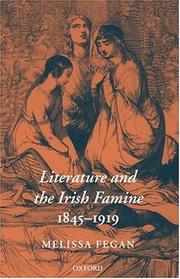| Listing 1 - 3 of 3 |
Sort by
|

ISBN: 0199254648 Year: 2002 Publisher: Oxford Clarendon
Abstract | Keywords | Export | Availability | Bookmark
 Loading...
Loading...Choose an application
- Reference Manager
- EndNote
- RefWorks (Direct export to RefWorks)
English literature --- -Famines in literature --- Literature and history --- -Literature and history --- -Famine in literature --- History and literature --- History and poetry --- Poetry and history --- History --- British literature --- Inklings (Group of writers) --- Nonsense Club (Group of writers) --- Order of the Fancy (Group of writers) --- Irish authors --- -History and criticism --- -History --- -Trollope, Anthony --- -Knowledge --- -Ireland --- Ireland --- Irish Free State --- -Historiography. --- In literature. --- Famines in literature. --- Famines in literature --- Famine in literature --- Irish authors&delete& --- History and criticism --- Trollope, Anthony, --- Trollop, Antonio, --- Trollop, Antoni, --- Knowledge --- Ireland. --- Historiography. --- History and criticism.

ISBN: 1280446870 0191555002 1423767519 9781423767510 0199254648 9786610446872 6610446873 9780199254644 0199254648 9781280446870 9780191555008 1383039534 Year: 2002 Publisher: Oxford New York Clarendon Press Oxford University Press
Abstract | Keywords | Export | Availability | Bookmark
 Loading...
Loading...Choose an application
- Reference Manager
- EndNote
- RefWorks (Direct export to RefWorks)
The impact of the Irish famine of 1845-1852 was unparalleled in both political and psychological terms. In this study, Melissa Fegan explores the famine's legacy to literature, tracing it in the work of contemporary writers and their successors, down to 1919.
English literature --- Famines in literature --- Literature and history --- English Literature --- Ireland --- Regions & Countries - Europe --- English --- Languages & Literatures --- History & Archaeology --- History and literature --- History and poetry --- Poetry and history --- History --- Famine in literature --- British literature --- Inklings (Group of writers) --- Nonsense Club (Group of writers) --- Order of the Fancy (Group of writers) --- Irish authors --- History and criticism --- Trollope, Anthony, --- Knowledge --- Ireland. --- Historiography. --- In literature. --- Trollop, Antonio, --- Trollop, Antoni, --- Irish Free State --- Literature and society --- History and criticism.
Book
ISBN: 1474211623 1441144951 1283122839 9786613122834 1441160280 9781441160287 9781283122832 9780826493453 0826493459 9780826493460 0826493467 9781441144959 9781474211628 6613122831 Year: 2008 Publisher: London New York Continuum
Abstract | Keywords | Export | Availability | Bookmark
 Loading...
Loading...Choose an application
- Reference Manager
- EndNote
- RefWorks (Direct export to RefWorks)
Readers and critics have been intrigued - and disturbed - by the characters of Wuthering Heights since its publication in 1847. Heathcliff and Catherine, the tormented and enigmatic lovers at the centre of the novel, have justifiably been the focus of critical attention. Yet the novel is peopled with a large cast of idiosyncratic characters, each of whom plays a significant role in the plot. This novel, with its references to physiognomy and monomania, its interest in dreams as revelations of the unconscious mind, and its recognition of the importance of origins in character-formation, reflects important developments in the conception of character and psychology in the nineteenth century.
Brontë, Emily, --- Brontë, Emily --- Brontë, Emily Jane --- Bell, Ellis --- Characters.
| Listing 1 - 3 of 3 |
Sort by
|

 Search
Search Feedback
Feedback About UniCat
About UniCat  Help
Help News
News